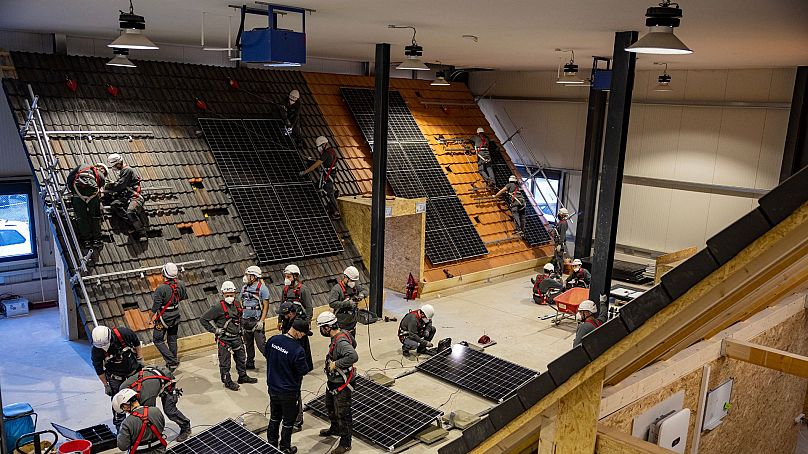As German solar demand surges, a new school has opened to train workers.
The German solar industry must train an “unbelievable number of people” to meet soaring demand, instructors have declared.
 ADVERTISEMENT
ADVERTISEMENT
 ADVERTISEMENT
ADVERTISEMENT
Solar power is key to Germany’s plan to become carbon neutral - and end its reliance on Russian energy.
Compared with 2021, the installed photovoltaic capacity in the residential sector has leapt by 40 percent.
Now, solar company Enpal has started its own vocational school, retraining people from ‘all backgrounds’ to power this transition.
"Since the Russian invasion of Ukraine, many people wanted to free themselves from fossil energy and the high costs of energy," said Wolfgang Gruendinger, spokesman for Enpal.
The Berlin start-up offers long-term solar panel rentals, complete with installation and maintenance.
The formula is proving attractive. Enpal, which began business in 2017, said it has rented 40,000 kits to individuals, including 18,000 last year alone.
It currently installs 2,000 kits a month.
"Demand is very strong. We have to install many units in the shortest possible time, while at the same time, we are seeing huge shortages in qualified workers," said Alexander Friedrich, who was hired by the company to train new employees.
Solar school is in session
To cope with the demand, Enpal set up its own training school last year in Blankenfelde, in the south of Berlin, to train workers to install panels, as well as train specialised electricians to work on photovoltaic panels.
"We are recruiting people from all backgrounds - former pizza workers, cooks, delivery riders, taxi drivers," said Gruendinger.
The company puts about 100 new hires through the school each month.
Among them is Ode, a 19 year old who responded to an advertisement on Instagram offering the four-week training.
Learning "something new" had attracted him to take on the challenge, he told AFP.
"I really enjoy the fact that it is a job that comes with fresh air and that you're always on the road," he added.
Enpal does not have prohibitive education criteria for their new hires. But one key requirement is for new recruits to climb a high ladder reaching at least two storeys up to screen out those with a fear of heights.
The sound of drills, screwdrivers and metal components being handled by groups of apprentices reverberated around the training hangar.
Wearing helmets and attached to ropes, the trainees were practising on roof replicas mounted on the ground.
Their task is urgent.
How quickly does Germany hope to transition to renewables?
Germany is aiming for 80 percent of its energy needs to be covered by renewables by 2030, against 46 percent a year ago.
To do so, lawmakers have set a target of installing 215 gigawatts (GW) of photovoltaic capacity by 2030 - meaning that annual rate of installation has to be tripled from last year's effort of 7.2 GW.
The plan is for roofs of factories and commercial buildings, as well as fields, to be covered with them, according to draft legislation promoting their installation.
But "the shortage of qualified workers threatens to slow down the energy transition", warned the Cologne-based think-tank German Economic Institute (IW) in a recent report.
The worker gap is so wide that the Federation of Solar Industries BSW said it was looking to Chancellor Olaf Scholz's ambitious immigration reform to provide some relief.
The law, expected to be passed this year, is aimed at easing immigration issues. The BSW cites the example of a recent agreement that aims to attract Indian workers trained in solar energy installations.
IW estimates that there is a shortfall of 216,000 electricians, heating and air-conditioning experts, and IT specialists necessary to develop the solar and wind energy sector in Germany. The figure does not take into account plans to bring back production of solar panels to Germany.
Currently, 80 percent of the panels' components come from China, according to the International Energy Agency.











